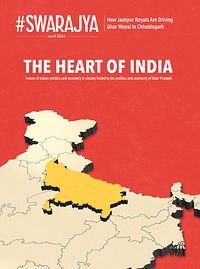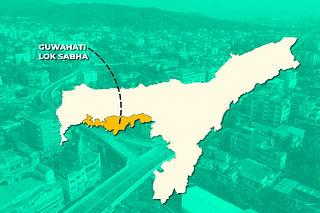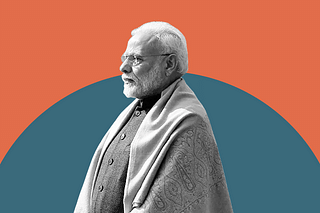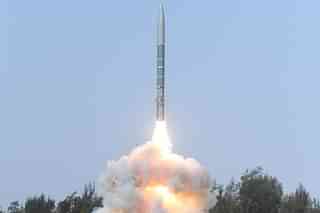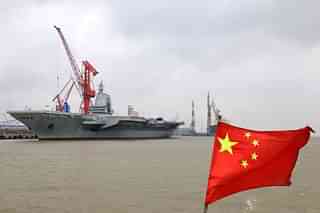Books
Book Excerpt: When Subramania Bharati Launched A Fund To Save VOC's Swadeshi Steam Navigation Company
A.R. Venkatachalapathy
Mar 30, 2024, 06:00 AM | Updated Apr 14, 2024, 04:19 PM IST
Save & read from anywhere!
Bookmark stories for easy access on any device or the Swarajya app.
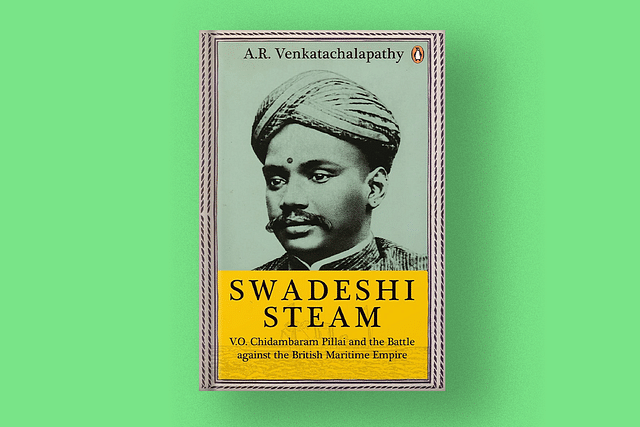
Swadeshi Steam: V.O. Chidambaram Pillai and the Battle against the British Maritime Empire. AR Venkatachalapathy. Penguin. Pages 514. Rs 655.
None of these efforts can compare with the impractical romanticism of Subramania Bharati. Bharati’s efforts were valiant and noble, if futile. But they bear testimony to the extraordinary idealism the poet exuded and the passion with which he conducted these efforts.
As we saw, Bharati put much store by the Swadeshi shipping venture. A strong backer of VOC, he called him ‘Our Leader’, going to the extent of referring to him as ‘a mahan’ (‘a great soul’). Borrowing from Aurobindo, he had even called this swarthy, stocky Dravidian as ‘the foremost of Aryans’— this was his free translation of Aurobindo’s description of VOC as ‘the first complete example of an Aryan reborn’.
For Bharati, VOC was father to the Swadeshi company and the two steamers his adorable daughters.
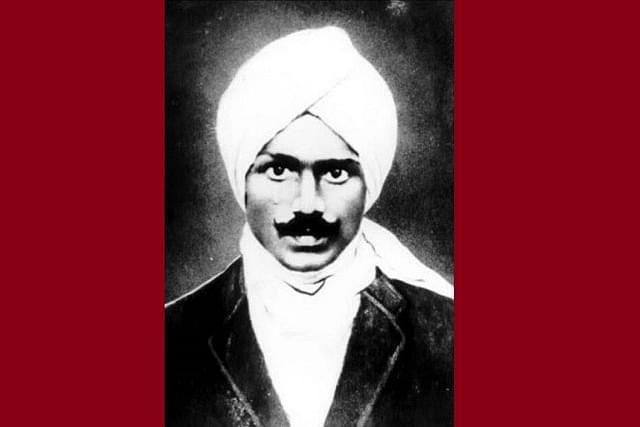
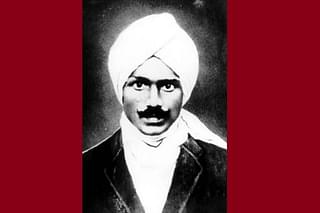
He had immortalized the heated exchange between VOC and Wynch in his poems. As the references to this work show, his weekly India provides an ardent chronicle of the trials and tribulations of SSNCo. Deeply agitated by the crisis in the company, an idealist Bharati launched a fund through his weekly to support it.
There was a personal dimension to his support as well. When Bharati was a young boy of ten, in 1892, his father Chinnaswamy Iyer had promoted an indigenous cotton ginning factory in Kovilpatti, not far from Tuticorin. But the factory collapsed leading to the death of his crestfallen father. Bharati blamed the British for this tragedy which upended his life. This experience must have weighed on him as SSNCo hurtled to a similar fate.
Impassioned pleas issued forth from Bharati. ‘Without the wind of public support,’ he said, ‘the Swadeshi ships are floundering. If only two lakh rupees could be raised, the company established by expending so much effort would be put on an even keel.’ Underplaying the daunting challenges, ‘We understand that there are some trifling difficulties,’ he continued, ‘the company’s management will no doubt sort them out in a trice. But is it right that we attempt to solve the troubles only as and when they crop up?’
Raising a comfortable sum was the key. How did the poet propose to raise Rs 2 lakh in two months? He first began by ruling out people who would not contribute. The Nattukkottai Chettiars? No, their purse strings would loosen only to empty flattery, dodgy vakils and lazy pilgrim rest houses. The zamindars? No, their riches were meant for whores, liquor and hosting dinner parties for white durais. Sahukars, mirasdars, high-ranking public officials and lords belonged to the same feather. These would only suck the country’s riches dry but would not spend half a paisa for the common good.
What then was the solution? We—poor people like us—who earn a daily wage, vakils’ clerks and ordinary workers should join hands and save this noble effort. The desperation in Bharati’s fervent, even frantic, appeals is unmistakable. Of the 160 lakh people in the Tamil country, take away 159.5 lakh; if the rest gave Rs 4 each, the target could be easily met, he suggested hopefully. VOC laid his trust in common people when he founded the company. He is one among us, and never once did he turn to zamindars and sahukars, Bharati reminded his readers.
Bharati also called upon matathipathis (heads of religious monasteries) to support indigenous industry and enterprise. If each monastery would contribute Rs 10,000 or 20,000, industry and handicrafts would thrive. Supporting indigenous industry was the highest form of religious charity, he contended. SSNCo was therefore a fit case for support.
How was one to contribute? Referring to himself in the third person, Bharati said, he was a poor man but from his meagre resources he had remitted Rs 5 to K.R. Venkatarama Aiyar—he did not even ask for a receipt. Of what avail was a piece of paper, he asked. Was it not enough that the nation prospered? Is it not enough that our national pride remained untarnished?
In a conversation with Bharati, K.R. Venkatarama Aiyar had told him that it would not be a good practice to accept contributions without issuing receipts, and therefore suggested that such public contributions should be made to the company under the supervision of a few trustees; the company could treat this as being part of share capital, and use the dividends from this investment to send Indian youths to Japan to be trained in navigation and maritime technologies.
Bharati had little patience for such proposals: all that was required was that funds should reach the company, and ‘our national pride should not suffer.’ Asking for funds to be sent to the India office, he helpfully added that its proprietor Mandayam S. Srinivasachari—whom we already encountered as an investor in the company—was also raising a fund for the same purpose. All contributions would be saved in a bank account, and once a substantial sum was accumulated it would be remitted to Tuticorin.
‘We don’t care what steps you will take. Somehow two lakh rupees should reach Tuticorin . . .’ he declared. Bharati did not stop with appealing to patriots. For good measure, he directed barbs at the moderate Congress leaders.
Firstly, he asked, what was the National Fund collected in Madras being used for? ‘We would like to be informed if the Swadeshi company has received any help from this fund? If it cannot be used for such a national effort what is the damned purpose of such a fund?’ he declaimed angrily.
The next barb was directed personally at the Moderate Congress-man V. Krishnaswamy Aiyar who claimed to support ‘a pure form of Swadeshi untainted by boycott [of foreign goods]’. ‘Why does he not support this cause from the huge fund he has amassed? Can he not use his influence to persuade the merchant class who come to litigate to make contributions to the Swadeshi company? His words are empty talk. It is futile to expect help from such impostors. This is a country of poor people. This effort is that of poor people. It is we, the poor, who should support this cause.’
A week later, Bharati was writing that ‘the minor troubles’ plaguing the company were being resolved. The Gallia was out of deep waters, he claimed. Bharati was not beyond giving false hopes to his readers; or was he deluding himself? But still, he said, people should not become complacent; they should treat this like their own family’s crisis. Charity had to be prompt. Doing the right thing should brook no delay.
Bharati urged others to emulate Ramaiyer, ‘a poor mirasdar’ as he called himself, from Melaiyur village of Thiruvidaimaruthur in Thanjavur district, who had remitted Rs 10.
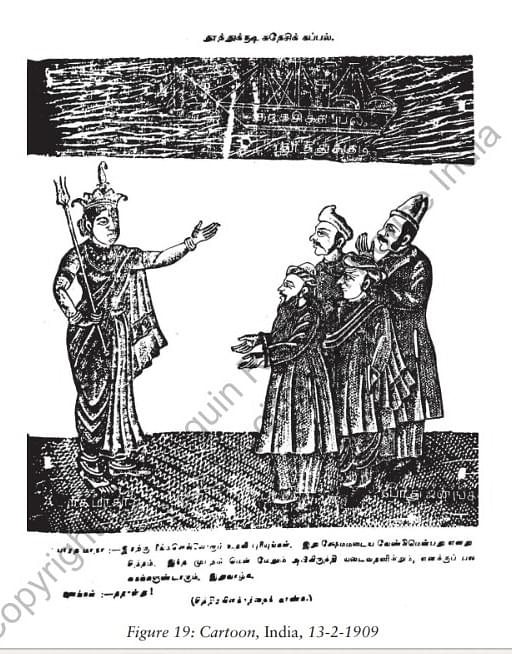
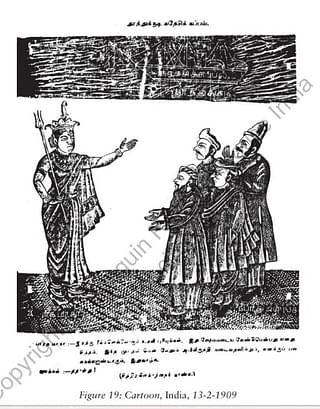
The following issue of India carried a cartoon. With a steamer on the seas in the background, Bharata Mata is seen exhorting the public: ‘It is my will that [the Swadeshi shipping venture] should succeed . . . May it flourish!’ Four men, representing the Indian people, are seconding her exhortation with the word, ‘Tathasthu!’ Whether ‘So be it!’ got translated into action is a different question.
Save & read from anywhere!
Bookmark stories for easy access on any device or the Swarajya app.
A.R. Venkatachalapathy is a historian and author.
Support Swarajya's 50 Ground Reports Project & Sponsor A Story
Every general election Swarajya does a 50 ground reports project.
Aimed only at serious readers and those who appreciate the nuances of political undercurrents, the project provides a sense of India's electoral landscape. As you know, these reports are produced after considerable investment of travel, time and effort on the ground.
This time too we've kicked off the project in style and have covered over 30 constituencies already. If you're someone who appreciates such work and have enjoyed our coverage please consider sponsoring a ground report for just Rs 2999 to Rs 19,999 - it goes a long way in helping us produce more quality reportage.
You can also back this project by becoming a subscriber for as little as Rs 999 - so do click on this links and choose a plan that suits you and back us.
Click below to contribute.
